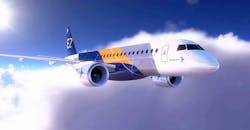The Boeing Co and Embraer SA have defined the terms of their much-anticipated joint venture, detailing a “Memorandum of Understanding to establish a strategic partnership” that will grant Boeing 80% ownership in a $4.75-billion commercial aircraft enterprise. The new business, not yet named, will be comprised of the current Embraer commercial aircraft and services business, which will be headquartered in Brazil but aligned with Boeing Commercial Airplanes’ commercial development, production, marketing and lifecycle services operations. Embraer will hold 20% of this new venture.
Boeing chairman Dennis Muilenburg stated that the “partnership clearly aligns with Boeing's long-term strategy of investing in organic growth and returning value to shareholders”.
The partners expect the venture to be finalized by late 2019, once the financial and operational terms of the partnership are fully defined, and their agreement gains all necessary shareholder and regulatory approvals.
Their joint announcement projected the new venture as one of "Boeing's centers of excellence for end-to-end design, manufacturing, and support of commercial passenger aircraft.” The U.S.-based OEM noted it will offer customers a portfolio of aircraft ranging from 70 to 450 seats, as well as jet freighters.
Boeing and Embraer committed to forming a separate joint venture “to promote and develop new markets and applications for defense products and services, especially the KC-390,” a twin-engine military transport jet developed by Embraer.
The potential Boeing-Embraer partnership was revealed late in 2017, following the announcement of Airbus SE’s purchase of a controlling stake in the Bombardier CSeries narrow-body jet program, though some reports indicate Boeing and Embraer had discussed their combination much earlier.
While the CSeries had struggled to gain market share versus the Boeing 737 and Embraer EJet programs, but the Airbus involvement elevated the competitive stakes with more marketing, R&D, manufacturing, and supply-chain resources than Bombardier’s line had previously.
Looking forward, the two parallel combinations are likely to strengthen both Boeing and Airbus against new market entries, and give Embraer and Bombardier the resources to proceed with their offerings in the regional and narrow-body aircraft segments.
About the Author
Robert Brooks
Content Director
Robert Brooks has been a business-to-business reporter, writer, editor, and columnist for more than 20 years, specializing in the primary metal and basic manufacturing industries.
